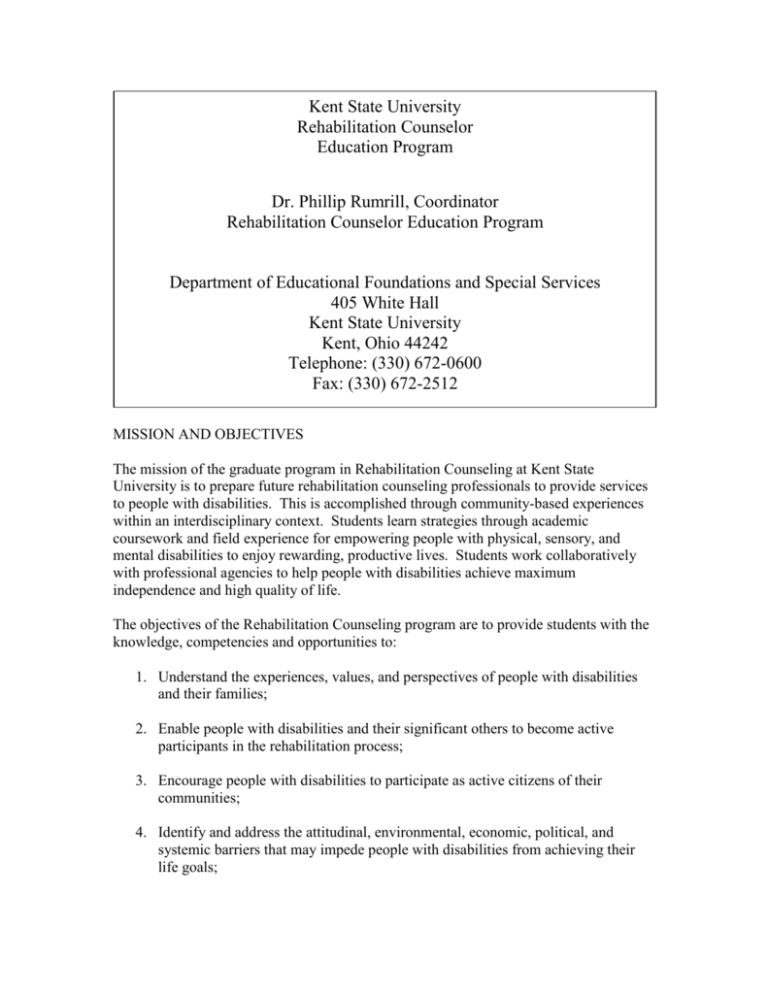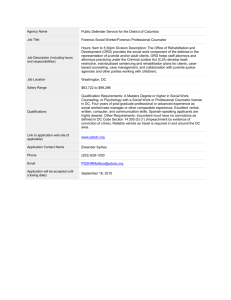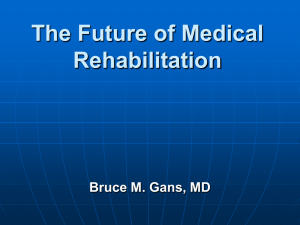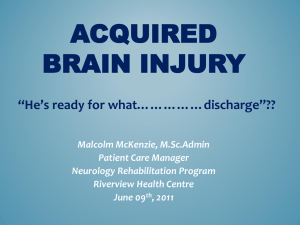program brochure - Kent State University
advertisement

Kent State University Rehabilitation Counselor Education Program Dr. Phillip Rumrill, Coordinator Rehabilitation Counselor Education Program Department of Educational Foundations and Special Services 405 White Hall Kent State University Kent, Ohio 44242 Telephone: (330) 672-0600 Fax: (330) 672-2512 MISSION AND OBJECTIVES The mission of the graduate program in Rehabilitation Counseling at Kent State University is to prepare future rehabilitation counseling professionals to provide services to people with disabilities. This is accomplished through community-based experiences within an interdisciplinary context. Students learn strategies through academic coursework and field experience for empowering people with physical, sensory, and mental disabilities to enjoy rewarding, productive lives. Students work collaboratively with professional agencies to help people with disabilities achieve maximum independence and high quality of life. The objectives of the Rehabilitation Counseling program are to provide students with the knowledge, competencies and opportunities to: 1. Understand the experiences, values, and perspectives of people with disabilities and their families; 2. Enable people with disabilities and their significant others to become active participants in the rehabilitation process; 3. Encourage people with disabilities to participate as active citizens of their communities; 4. Identify and address the attitudinal, environmental, economic, political, and systemic barriers that may impede people with disabilities from achieving their life goals; 5. Develop and demonstrate counseling techniques and career development strategies to assist people with disabilities in establishing the skills they need to participate actively in all aspects of society; 6. Join the rehabilitation counseling profession and adhere to the highest ethical standards, always in the best interests of people with disabilities. OVERVIEW Rehabilitation Counseling is a counseling specialty offered at Kent State University. This description has been written to clarify the role and function of the rehabilitation counselor and the preparation offered at Kent State University. The unique competencies that you would acquire in this program are not interchangeable with community counseling, social work, school counseling, or other counseling specialties. Rehabilitation counseling is a process – a process that builds upon the strengths and goals of persons with disabilities. Typically, clients of rehabilitation counselors are late adolescents and adults who have physical, emotional, or intellectual disabilities. The goal of rehabilitation counseling is integration and inclusion of persons with disabilities in society. The mission of the Rehabilitation Counselor Education Program at Kent State University is to prepare competent professionals who will provide quality service to persons with disabilities. Rehabilitation counselors work in a variety of settings. Employers of rehabilitation counselors include hospitals, public agencies (e.g., vocational rehabilitation, mental health, developmental disabilities), Bureau of Worker’s Compensation, drug and alcohol treatment centers, correctional facilities, community-based programs, comprehensive rehabilitation facilities, private industry, and proprietary rehabilitation. The process of rehabilitation is defined by values which permeate each phase of the rehabilitation process: individualization, integration, independence, and industry. Each individual with a disability has a unique constellation of strengths, abilities, weaknesses, interests, hopes, goals, and fears. An individualized process is employed to define and implement a program of services and counseling to enable and empower persons who have disabilities. The curriculum at Kent State University is imbued with the belief that early and continual service and development of professional skills predict success as a rehabilitation counselor. Course content is tied to observable skills and thoughtful practice. Throughout the four semesters of full-time academic coursework, students gain supervised experience as rehabilitation counselors. This includes an internship experience which can be completed in a variety of settings including rehabilitation agencies, community mental health centers, Bureau of Worker’s Compensation, county boards of MR/DD, schools, hospitals, drug and alcohol treatment centers, and community corrections. This process of professionalization for the rehabilitation counseling student occurs throughout the learning experience. With completion of 75% of coursework the student is eligible to sit for the written examination by the Commission on Rehabilitation Counselor Certification. This nationally standardized examination is scheduled for those desiring to become Certified Rehabilitation Counselors (C.R.C.) The C.R.C. is a credential recognized internationally as evidence of competence and professionalism ni the field of rehabilitation counseling. In addition, sub-specialization in deafness, transition, and job development and placement are available. ADMISSION SELECTION AND ADVISEMENT The student must meet the admission standards of the Graduate School of Education. Applicants for the Rehabilitation Counseling Program are interviewed throughout the year and may be admitted to start studies in the Spring, Fall, or Summer. Catalogues, application materials, and information regarding admission are available at the Graduate School of Education Office, 308 White Hall, Kent State University, Kent, Ohio 44242-0001. Telephone (330) 672-2576. No prerequisite major is required for the Rehabilitation Counseling program. Academic performance is regarded as an important factor in selection. To be admitted, applicants must have at least a 2.75 undergraduate grade-point average. Acceptable qualifications may be determined by consultation with the Coordinator of the Rehabilitation Counselor Education program. Following receipt of the Graduate School of Education application, the Program Coordinator will arrange an interview with the student applicant. The ability of the student to utilize the program’s learning sequence and his/her potential for success in the field of rehabilitation counseling are assessed during the interview. If the student is accepted into the program, notification is sent to the applicant immediately. As courses are arranged sequentially, it is advantageous for full-time students to start the program in the fall semester. Students may attend part-time and extend the program over a longer period of time. Course sequence for part-time student and students who are unable to begin work in the fall semester is planned with close faculty advisement. Most classes are offered n the evening to accommodate part-time students in the program. A Student Handbook containing information about the program and directions for different phases of study is distributed to new students. Students are strongly encouraged to join the National Rehabilitation Counseling Association (NRCA) and/or the American Rehabilitation Counseling Association (ARCA) as part of their professional acculturation. Each student is assigned a faculty advisor. Individual meetings with advisors are held as needed throughout the year. RCE FACULTY IN PROGRAM Robert W. Flexer earned his bachelor’s and master’s degrees in Rehabilitation from Pennsylvania State University and received a doctoral degree in Rehabilitation Research from the University of Connecticut. His work experience includes rehabilitation counseling in mental health, teaching special education, and directing research projects in a Rehabilitation Research and Training Center on Habilitation of persons with mental retardation and/or developmental disabilities. Dr. Flexer teaches and works in the area of developmental disabilities and specializes in integrated service delivery of vocational, educational, and other social services. Connie McReynolds earned her bachelor’s and master’s degrees from Oklahoma City University and Emporia State University, respectively. She received her Ph.D. in Rehabilitation Psychology from the University of Wisconsin-Madison. A former Vocational Rehabilitation Counselor for the state of Kansas, Dr. McReynolds’ research interests include HIV/AIDS, psychiatric disabilities, substance abuse, and career development. Phillip Rumrill earned his bachelor’s and master’s degrees in psychology and counseling from Keene (New Hampshire) State College and received his Ph.D. in Rehabilitation from the University of Arkansas. His professional experience includes substance abuse counseling, advising college students with disabilities, and teaching in the Rehabilitation Counseling Program at the University of Wisconsin-Milwaukee. Dr. Rumrill’s research interests include implementation of the Americans with Disabilities Act, chronic illness, and the career development implications of disability. Courtney Vierstra received her Ph.D. in Special Education with an emphasis in Rehabilitation Counseling from Kent State University. Her professional background includes direct service and managerial experience in working with people with developmental disabilities and traumatic injuries, job development and placement, case management, and vocational evaluation. Dr. Vierstra’s research interests include issues facing students with disabilities in higher education, emerging disabilities and rehabilitation implications, psychosocial and vocational implications of multiple chemical sensitivity, issues facing people with chronic illnesses, and disability legislation and policy. CORE PROGRAM DESCRIPTIONS AND CLASS SCHEDULE RHAB 6/77712 Introduction to Rehabilitation (3 hours): (Fall/Spring) Introductory course surveys philosophy, history and legislation in rehabilitation, which is defined as a process, social movement and public mandate. Particular emphasis is given to the role and function of the rehabilitation counselor in the private and public sectors. RHAB 6/77725 Psycho-Social Impact of Disability (3 hours): (Fall) Introduction to major concepts in rehabilitation regarding the impact of disability of the individual, the family and the community. Normalization, stigma and adjustment to loss emphasized. RHAB 6/77729 Measurement and Appraisal in Rehabilitation (3 hours): (Fall/Summer) Review of measurement theory and principles as applied in rehabilitation. Demonstration of instruments used in vocational assessment. EDUC 65510 Statistics I for Educational Services (3 hours): (All Semesters) Introduction to descriptive and inferential statistics used in educational services research: univariate and bivariate techniques (correlation and simple regression); hypothesis testing; non-parametric techniques. Enhanced use of the GB-STAT package. RHAB 6/77723 Medical Information for Rehabilitation Counselors(3 hours): (Spring) Study of the physical impact of disease or injury on individuals; available medical and restorative resources; skills in interpreting medical reports and rehabilitation planning. RHAB 6/77731 Individual Counseling Procedures for Rehabilitation Counselors (3 hours): (All Semesters) Development of belief system as a counselor, skills in communication, interviewing, problem identification, goal-setting and program development are fostered by lecture, video feedback and simulation. RHAB 6/77732 Occupational Aspects of Disability (3 hours): (Fall/Spring) An introduction to a wide range of occupational and vocational analysis through job analysis, job seeking, job placement, job restructuring, work adjustment and independent living approaches. CHDS 6/78182 Career Development and Guidance (3 hours): (Fall/Spring) The world of work, theories of career choice, techniques in career guidance. An introductory course in the careers area for practitioners in education, helping services, human resources and personnel. RHAB 6/77743 Psychiatric Rehabilitation (3 hours): (Spring) Review of psychiatric, alcohol and other drug-related disabilities and their treatment. Topics include psychosocial rehabilitation, case management and psychotropic medication. RHAB 6/77744 Drug and Alcohol Rehabilitation (3 hours): (Fall) Review of substance abuse treatments, trends, modalities and community agencies; vocational implications of substance abuse; vocational assessment issues and job placement options. RHAB 6/77736 Individual Counseling Practicum in Rehabilitation Counseling ( 4 hours total – 2 hours/semester): (All Semesters) Supervised, controlled exposure to rehabilitation clients; examine alternative modes of intervention; group and individual feedback sessions using audio and videotape recordings. RHAB 6/7776 Seminar on Research in Disabilities (3 hours): (Spring/Summer) Survey of the research literature in disabilities. Guidelines for evaluating and implementing research findings. Acquaints students with current research. Evaluation of design, statistical analysis and conclusions. RHAB 77792 Internship in Rehabilitation Counseling (6 hours): (All Semesters) Assignments to rehabilitation agency for extensive and intensive applications for rehabilitation counseling, consulting and coordinating. Supervision of internships shared jointly by rehabilitation agency and the university instructor. RHAB 6/77728 Adjustment and Training Groups in Rehabilitation (3 hours): (Fall) Groups are studied as intervention for adjustment to disability and skill training through readings, lectures, and experiential approaches. The remainder of the curriculum is composed of Universal Professional Requirements prescribed by the College of Education and Electives (a total of 4 hours), which must be pre-approved by the student’s faculty advisor. The following page presents the M.Ed. program prospectus, which lists all required courses.






